Workplace social media policy template and guide
Published
Workplace social media policy template and guide
Published
Social media can be a powerful tool for your business, but without clear guidelines, it can also pose significant risks. A well-defined social media policy is essential for small business owners, as it sets expectations for how employees should represent themselves and your business online. This isn’t about restricting your team’s personal freedom; it’s about protecting your brand, maintaining a respectful workplace culture, and empowering your employees to be responsible online advocates for your company.
Having a clear policy in place helps manage how your team uses social media, provides clear guidance for everyone and gives your employees the confidence to engage online responsibly.
What is in this social media policy template?
Our customizable social media policy template is designed for Canadian SMBs to get you started on crafting a policy that works for your business. This template includes sections on:
- Purpose and scope.
- Roles and responsibilities.
- Code of conduct.
- Personal use guidelines.
- Monitoring and enforcement.
Our template is a perfect starting point. It’s a foundational document you can easily edit and personalize to fit the specific needs of your business. Having a positive company culture starts with clear workplace policies. Download our template now and take the first step toward a more secure, professional and confident online presence for your business.
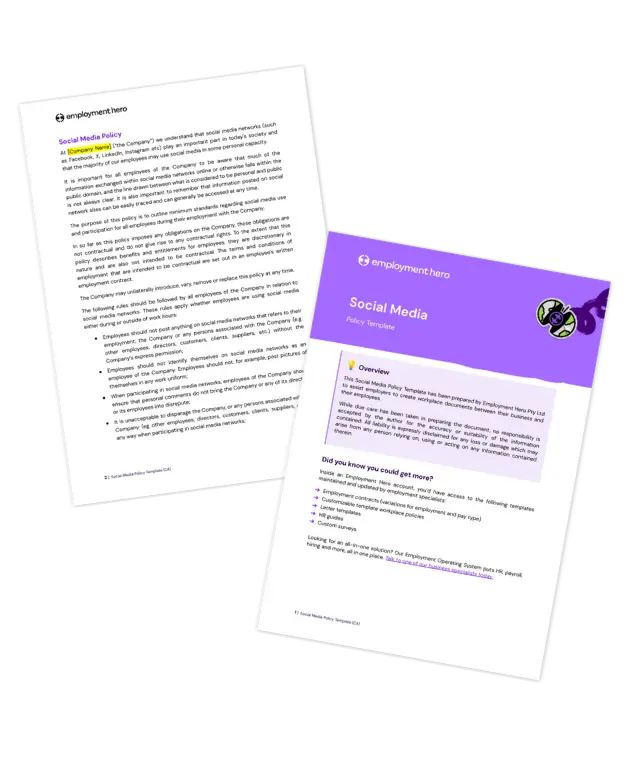
What is a social media policy for employees?
A social media policy is a set of guidelines that outlines how employees should behave on social media platforms when representing your business or discussing work-related matters. This policy helps protect your brand’s reputation, security, privacy, and legal interests by clarifying what is considered acceptable and unacceptable online behaviour.
Since most people use social media daily for both personal and professional reasons, a policy provides a framework for responsible use that aligns with your organization’s values and objectives.
Why do businesses need a social media policy?
Implementing a social media policy can protect your business in a number of key areas:
Protecting your company’s reputation
Employees often act as brand representatives on social media, but their posts and interactions can directly impact your brand’s reputation. A policy provides guidance on appropriate content and behaviour, helping to prevent employees from posting confidential, sensitive or damaging information.
Managing compliance
A clear social media policy helps ensure that employees comply with relevant laws and industry standards, such as those for data protection and privacy. This proactive approach can prevent legal issues like privacy violations, defamation or intellectual property infringement.
Clarifying expectations
A policy sets clear expectations for employee behaviour on social media platforms, defining what is acceptable and what is not. This transparency ensures employees understand their responsibilities and are held accountable for what they post on both personal and corporate profiles.
Encouraging responsible use
It’s crucial to educate employees about the importance of responsible social media use and the potential consequences of inappropriate behaviour, which can include disciplinary action. Your policy can serve as an educational tool to prevent the unknowing leak of sensitive information.
Supporting employee advocacy
Beyond just setting rules, a social media policy can encourage employees to promote your company’s products, services or culture in a way that aligns with your business’s goals and values. With social media playing a significant role in how job seekers gain insight into company culture, empowering your employees to be positive advocates can be incredibly important for building your employer brand.
Social media policy template
Here’s a preview of the policy template you can download and customize based on your requirements:
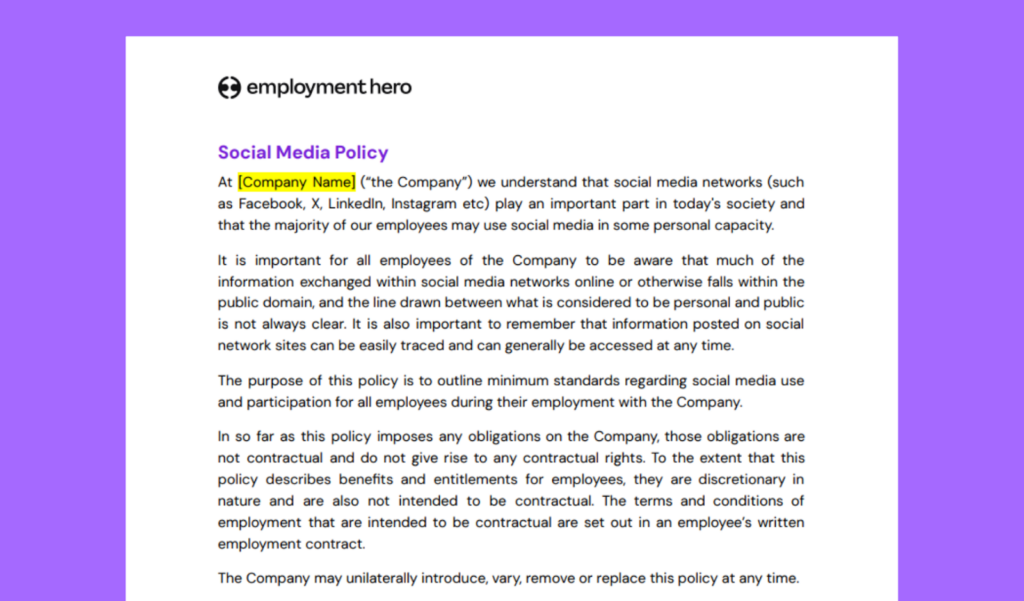
How to make a social media policy
A comprehensive social media policy should include several key components to ensure it is effective and easy to understand.
- Purpose and scope. Start by clearly stating the policy’s purpose and the social media channels it applies to, such as Facebook, X, LinkedIn, Instagram, YouTube and TikTok.
- Responsibilities. Outline the roles and responsibilities of all employees, managers, and the organization itself when it comes to managing social media. This ensures everyone knows who is accountable for maintaining standards.
- Code of conduct. Provide clear guidance on what constitutes acceptable and unacceptable behaviour. This should include examples like avoiding the sharing of confidential information or making rude comments about colleagues or customers.
- Personal use. Address the use of personal social media accounts. Clarify whether employees can use social media during work hours and what kind of personal content or topics are strictly forbidden. Your policy should also make it clear that an employee’s personal views do not represent those of the company.
Challenges in implementing a social media policy
Implementing a social media policy can come with its own set of challenges, but you can address them with the right approach.
Employee resistance
Some employees might see a social media policy as a limitation on their personal freedoms. To overcome this, communicate the rationale and benefits of the policy so they understand its purpose.
Lack of awareness or training
Employees might not be aware of the potential risks associated with inappropriate social media use. Providing regular training and education can help them develop the skills and knowledge to use social media responsibly.
The changing nature of social media
Social media platforms and trends evolve rapidly, making it challenging to keep up. To address this, make sure to review and update your policy regularly, perhaps on a bi-annual or annual basis, to reflect the latest changes.
Enforcement
Enforcing the policy can be difficult, especially when a violation occurs. To ensure compliance, have a clear disciplinary process in place and make sure all employees are aware of the consequences for non-adherence.
Download our social media policy template
Ready to protect your business and set clear expectations for your team? Download our free, customizable Social Media Policy Template and start crafting a policy that works for your business.
Need more guidance on policy creation? Our HR Advisory team supports SMBs with compliance checks, expert workplace consulting and with an extensive resource library in our platform. Talk to our business specialists to find out more.
The information in this template is current as at 1 September 2025, and has been prepared by Employment Hero Pty Ltd (ABN 11 160 047 709) and its related bodies corporate (Employment Hero). The views expressed in this template are general information only, are provided in good faith to assist employers and their employees, and should not be relied on as professional advice. The Information is based on data supplied by third parties. While such data is believed to be accurate, it has not been independently verified and no warranties are given that it is complete, accurate, up to date or fit for the purpose for which it is required. Employment Hero does not accept responsibility for any inaccuracy in such data and is not liable for any loss or damages arising either directly or indirectly as a result of reliance on, use of or inability to use any information provided in this template. You should undertake your own research and to seek professional advice before making any decisions or relying on the information in this template.
Frequently asked questions about social media policies
A social media policy is a crucial document that outlines acceptable online behaviour for employees when they’re representing your business or discussing work-related topics. It’s essential for your business because it safeguards your brand’s reputation, helps manage legal and compliance risks, clarifies expectations for employee conduct, and fosters a culture of responsible social media use, ultimately empowering your team to be positive online advocates for your company.
A comprehensive social media policy should include clear guidelines on purpose and scope, outlining which platforms it applies to and its overall objective. It should define the responsibilities of all employees, managers and the organization regarding online conduct, and establish a clear code of conduct with examples of acceptable and unacceptable behaviour, especially concerning confidential information or disrespectful comments. Additionally, the policy must address personal social media use, clarifying permissible activity during work hours and emphasizing that personal views do not represent the company, ensuring a transparent framework for responsible online engagement.
A robust social media policy is your front-line defence against reputational damage and legal issues. By setting clear expectations, it prevents employees from inadvertently sharing confidential information, making disparaging remarks or engaging in activities that could be misconstrued as official company endorsements. It also ensures compliance with data protection laws and intellectual property rights, minimizing the risk of costly litigation. Ultimately, a well-crafted policy acts as a proactive shield, protecting your brand’s integrity and legal standing in the digital landscape.
Ensuring employees understand and comply with your social media policy requires a multi-faceted approach. Start with comprehensive, mandatory training sessions that clearly explain the policy’s purpose, key guidelines and the potential consequences of non-compliance, using real-world examples to illustrate acceptable and unacceptable behaviour. Make the policy easily accessible and visible, perhaps on your company intranet or a dedicated HR portal, and encourage regular review. Foster an open environment where employees feel comfortable asking questions, and lead by example by demonstrating responsible social media use at all levels of the organization. Consistent enforcement, coupled with ongoing communication and support, will build a culture of compliance and responsible online conduct.
Given the dynamic nature of social media platforms and trends, your social media policy should be a living document, not a static one. To ensure it remains effective and relevant, it’s advisable to review and update your social media policy at least annually or ideally, semi-annually. This regular review allows you to incorporate changes in platform functionalities, emerging legal precedents, shifts in industry best practices and any new company objectives related to social media, thus keeping your guidelines current and your business protected.
Register for the template
Related Resources
-
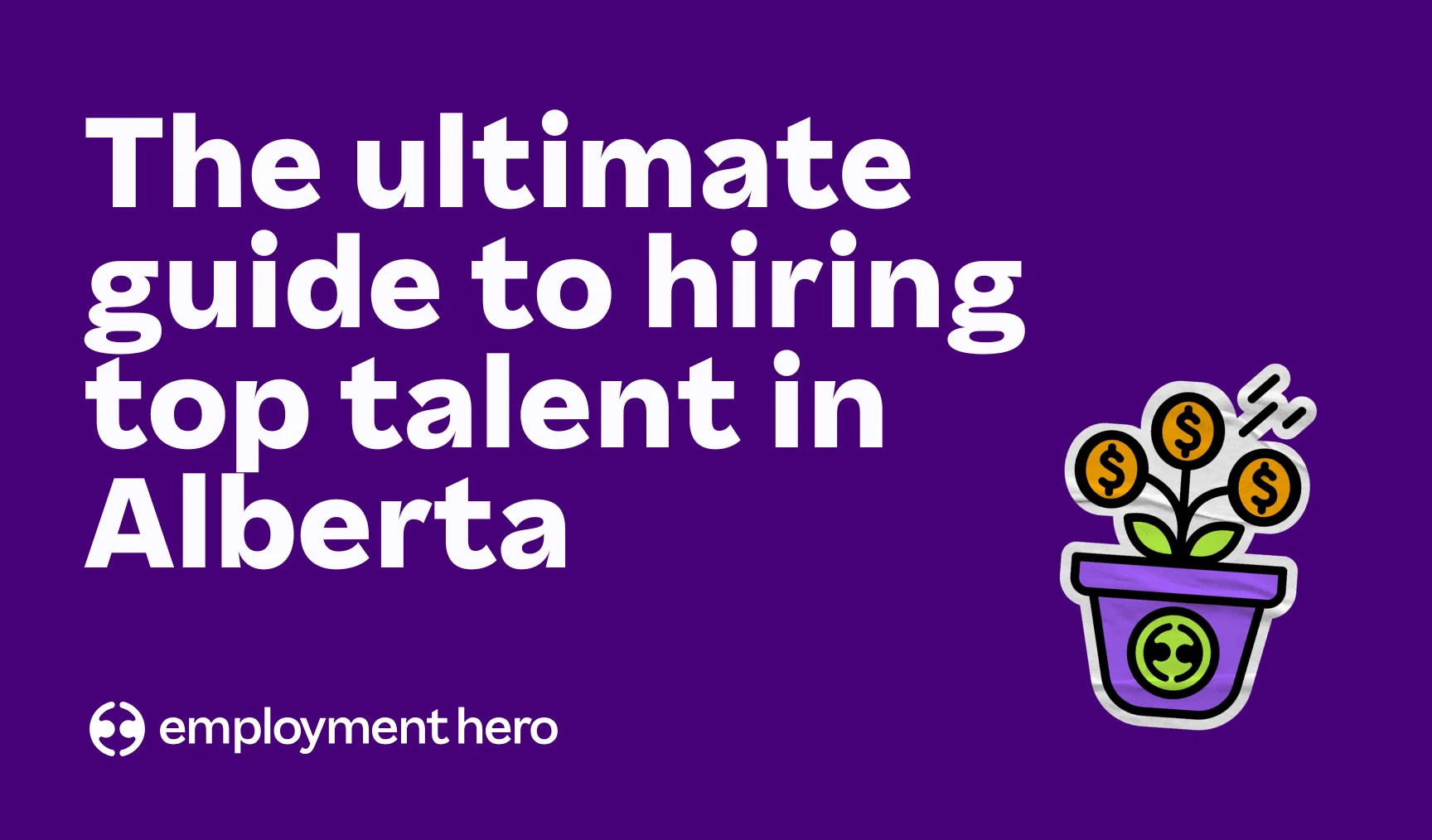 Read more: The ultimate guide to hiring top talent in Alberta
Read more: The ultimate guide to hiring top talent in AlbertaThe ultimate guide to hiring top talent in Alberta
From the new 27-week job-protected leave to hiring interprovincial talent, here is your essential guide to hiring and retaining staff…
-
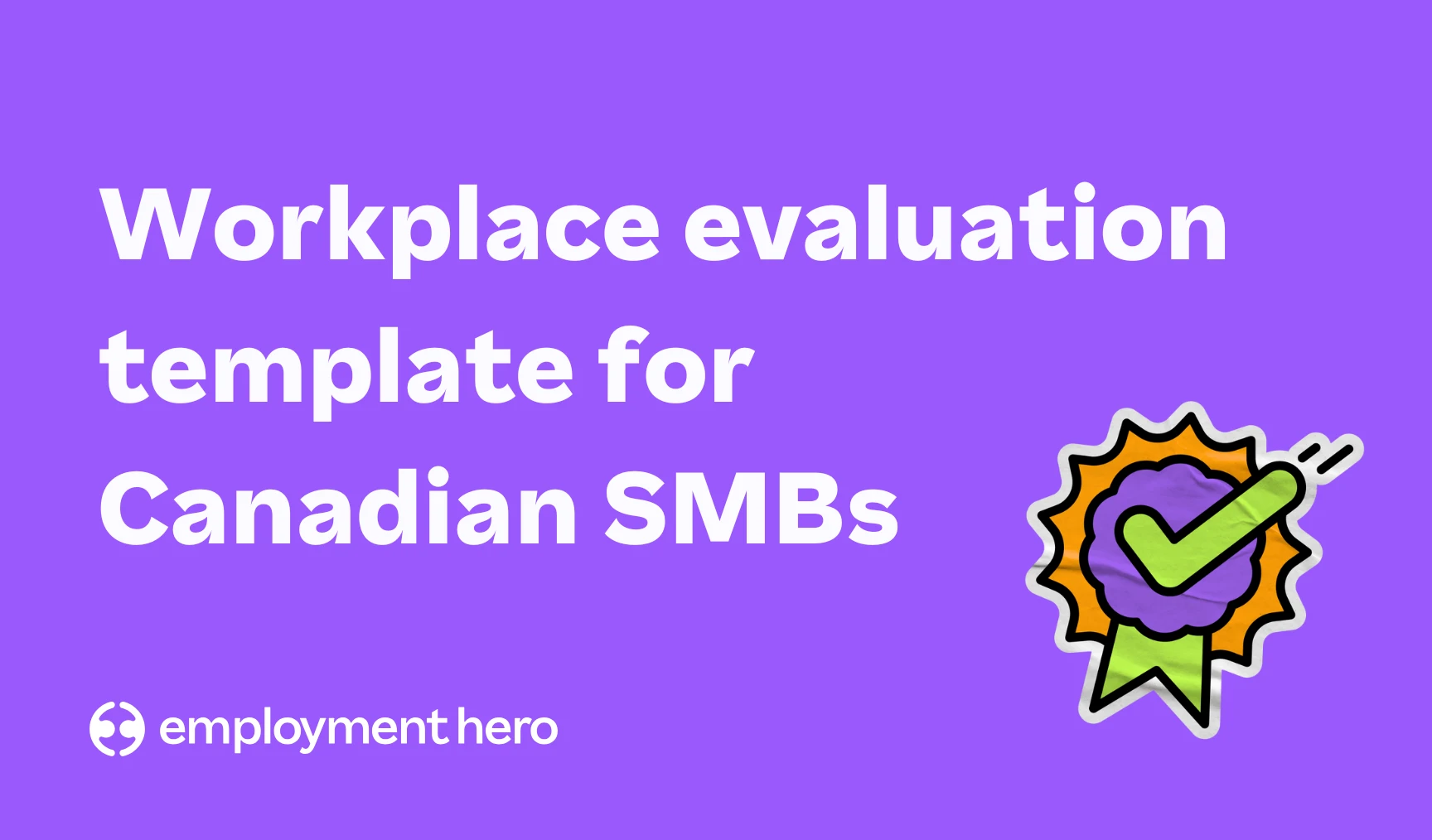 Read more: Workplace evaluation template: performance reviews
Read more: Workplace evaluation template: performance reviewsWorkplace evaluation template: performance reviews
Streamline performance reviews with our top workplace evaluation template. Enhance feedback and boost employee engagement.
-
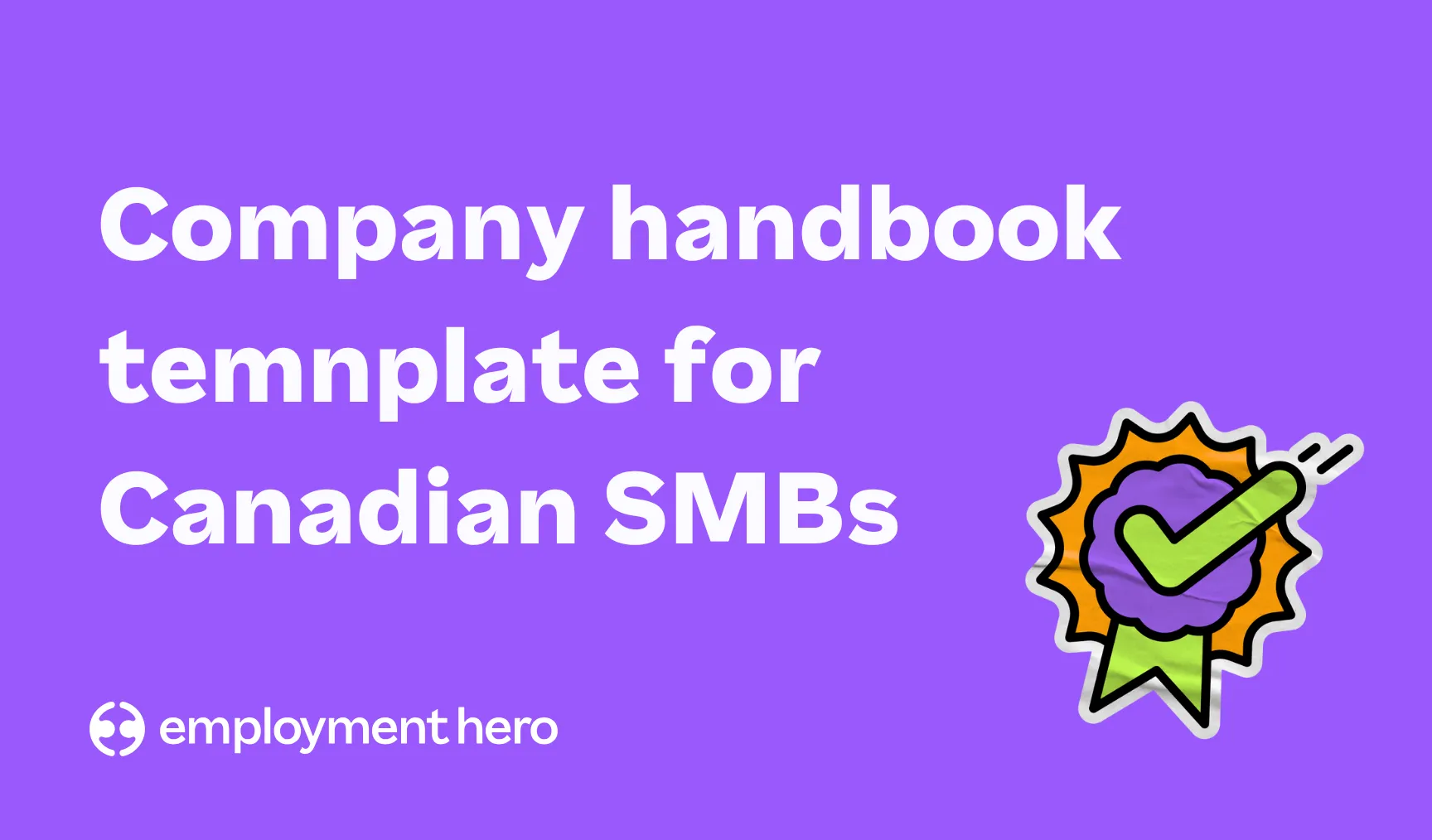 Read more: Your guide to creating a company handbook: template for Canadian businesses
Read more: Your guide to creating a company handbook: template for Canadian businessesYour guide to creating a company handbook: template for Canadian businesses
Create a strong foundation for your business with our company handbook template. Streamline policies and procedures.


















